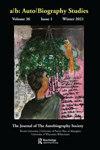不道歉:珍妮·迪斯基为女性写作的虚构回忆录道歉
Q1 Arts and Humanities
引用次数: 0
摘要
摘要本文认为,珍妮·迪斯基的最后一部小说《为女性写作道歉》充实了人们对她的文艺观的理解,对她的非虚构作品形成了补充。利用生存的概念和弗洛伊德的神秘,这篇文章展示了米歇尔·德·蒙田和玛丽·德·古尔内以及德·古尔内和她的仆人雅明之间的关系是如何建立在情感参与的概念之上的,在情感参与的概念中,写作的智力劳动结合了兴奋的身体体验。这种将文学视为情感的观点直接与文本生存的力量联系在一起。本文章由计算机程序翻译,如有差异,请以英文原文为准。
No Apologies: Jenny Diski’s Apology for the Woman Writing as Fictional Memoir
Abstract This essay argues that Jenny Diski’s final novel, Apology for the Woman Writing, adds to the understanding of Diski’s view on literature and the arts, thus complementing her nonfiction writing. Drawing on notions of survival and the Freudian uncanny, the essay shows how the relationships between Michel de Montaigne and Marie de Gournay and between De Gournay and her servant Jamyn are built around notions of affective engagement, where the intellectual labor of writing conjoins physical experiences of excitement. Such a view of literature as affect is then directly connected to the force of a text to survive.
求助全文
通过发布文献求助,成功后即可免费获取论文全文。
去求助
来源期刊

a/b: Auto/Biography Studies
Arts and Humanities-Literature and Literary Theory
CiteScore
0.80
自引率
0.00%
发文量
27
期刊介绍:
a /b: Auto/Biography Studies enjoys an international reputation for publishing the highest level of peer-reviewed scholarship in the fields of autobiography, biography, life narrative, and identity studies. a/b draws from a diverse community of global scholars to publish essays that further the scholarly discourse on historic and contemporary auto/biographical narratives. For over thirty years, the journal has pushed ongoing conversations in the field in new directions and charted an innovative path into interdisciplinary and multimodal narrative analysis. The journal accepts submissions of scholarly essays, review essays, and book reviews of critical and theoretical texts as well as proposals for special issues and essay clusters. Submissions are subject to initial appraisal by the editors, and, if found suitable for further consideration, to independent, anonymous peer review.
 求助内容:
求助内容: 应助结果提醒方式:
应助结果提醒方式:


